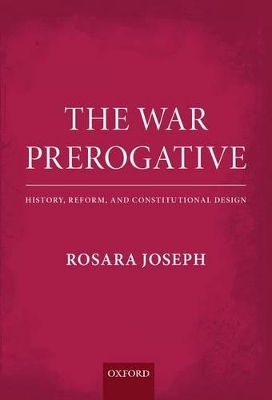
The War Prerogative
History, Reform, and Constitutional Design
Seiten
2013
Oxford University Press (Verlag)
978-0-19-966432-0 (ISBN)
Oxford University Press (Verlag)
978-0-19-966432-0 (ISBN)
The war prerogative is the power of the Crown, exercised by the government, to declare war and deploy armed forces overseas. This book traces the theory and practice of the war prerogative in England from 1600 to the modern day and considers potential reform of the constitutional arrangements for its exercise.
This book studies the evolution of the war prerogative in England from 1600-2012. It traces the historical theory and practice of the war prerogative and proposes reform of the constitutional arrangements for its exercise. It addresses three key questions. First, what have writers on political and constitutional theory said about the constitutional arrangements for the war prerogative, and, in particular, what justifications have been advanced for those arrangements? Secondly, in practice, has the executive in fact possessed sole and exclusive powers over war and the deployment of force, or have Parliament and the courts had a role to play in their exercise and scrutiny? Thirdly, are there better ways to organise our constitutional arrangements for the war prerogative, to enable a more substantive role for Parliament (particularly the House of Commons) in its exercise and scrutiny?
On the first question, it is shown that orthodox theoretical and political discourses have continuously asserted the executive's exclusive power over war, but the justifications advanced for that arrangement have changed over time. Those changes reflect the varying influence of different political theories at different times. On the second question, it is found that, contrary to orthodox theoretical and political discourses, Parliament has played an active and substantive role in the exercise and scrutiny of the war prerogative. The courts have refused to intervene in the exercise of the war prerogative, but have been more ready to intervene in cases involving the exercise of powers incidental to the war prerogative. On the third question, it is argued that reform of the constitutional arrangements for the war prerogative is necessary and desirable. The use of 'institutional mechanisms' is recommended, which are small-scale rules and institutional arrangements, within existing institutions, which aim to promote certain normative goals. In particular, the enactment of a statute is proposed, which would impose conditions on the executive's exercise of its war prerogative. It is argued that these proposals show that, through careful institutional design, democratic values, national security, and operational efficiency can each be reconciled and promoted.
This book studies the evolution of the war prerogative in England from 1600-2012. It traces the historical theory and practice of the war prerogative and proposes reform of the constitutional arrangements for its exercise. It addresses three key questions. First, what have writers on political and constitutional theory said about the constitutional arrangements for the war prerogative, and, in particular, what justifications have been advanced for those arrangements? Secondly, in practice, has the executive in fact possessed sole and exclusive powers over war and the deployment of force, or have Parliament and the courts had a role to play in their exercise and scrutiny? Thirdly, are there better ways to organise our constitutional arrangements for the war prerogative, to enable a more substantive role for Parliament (particularly the House of Commons) in its exercise and scrutiny?
On the first question, it is shown that orthodox theoretical and political discourses have continuously asserted the executive's exclusive power over war, but the justifications advanced for that arrangement have changed over time. Those changes reflect the varying influence of different political theories at different times. On the second question, it is found that, contrary to orthodox theoretical and political discourses, Parliament has played an active and substantive role in the exercise and scrutiny of the war prerogative. The courts have refused to intervene in the exercise of the war prerogative, but have been more ready to intervene in cases involving the exercise of powers incidental to the war prerogative. On the third question, it is argued that reform of the constitutional arrangements for the war prerogative is necessary and desirable. The use of 'institutional mechanisms' is recommended, which are small-scale rules and institutional arrangements, within existing institutions, which aim to promote certain normative goals. In particular, the enactment of a statute is proposed, which would impose conditions on the executive's exercise of its war prerogative. It is argued that these proposals show that, through careful institutional design, democratic values, national security, and operational efficiency can each be reconciled and promoted.
Rosara Joseph holds an LLB (Hons) and a BA from the University of Canterbury, New Zealand, and a BCL and D.Phil from the University of Oxford, where she was a Rhodes Scholar. She has previously worked as a Judge's clerk for the President of the New Zealand Court of Appeal, and has represented New Zealand at the Olympic Games, Commonwealth Games, and World Championships in cycling.
1. Introduction ; 2. Theoretical and Political Discourses: The War and Foreign Policy Powers ; 3. The War Prerogative in Practice ; 4. Judicial Treatment of the War Prerogative ; 5. Institutional Mechanisms ; 6. Reform ; 7. Conclusions ; Bibliography
| Verlagsort | Oxford |
|---|---|
| Sprache | englisch |
| Maße | 162 x 236 mm |
| Gewicht | 530 g |
| Themenwelt | Geschichte ► Teilgebiete der Geschichte ► Militärgeschichte |
| Recht / Steuern ► EU / Internationales Recht | |
| Recht / Steuern ► Öffentliches Recht | |
| Recht / Steuern ► Rechtsgeschichte | |
| Sozialwissenschaften ► Politik / Verwaltung ► Staat / Verwaltung | |
| ISBN-10 | 0-19-966432-3 / 0199664323 |
| ISBN-13 | 978-0-19-966432-0 / 9780199664320 |
| Zustand | Neuware |
| Haben Sie eine Frage zum Produkt? |
Mehr entdecken
aus dem Bereich
aus dem Bereich
neueste Manipulationstechniken als Waffengattung der NATO
Buch | Softcover (2023)
Westend (Verlag)
CHF 33,55
Deutschlands Schwäche in der Zeitenwende
Buch | Softcover (2023)
C.H.Beck (Verlag)
CHF 25,20


